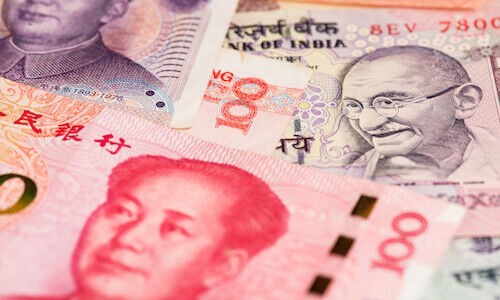Asia Spotlighted as Post-SWIFT Alternative for Russia
Russia is now rushing to adjust its financial system to survive in a post-SWIFT era with Asia spotlighted for alternative options.
As global banks and governments rush to sanction Russia over its recent invasion of Ukraine, Asia has emerged as a relevant alternative for payments.
Home to two out of the three UN Security Council Members that abstained from voting to deplore the Russian invasion – China and India – the world’s most populous nations could provide support to offset difficulties in market access.
China’s CIPS
China’s Cross-Border International Payments System (CIPS) is the most noteworthy competitor to SWIFT, with related Chinese payment stocks like Newland Digital Technology, Lakala Payment and Client Service International trading higher following news of the sanctions.
Although it currently houses significantly less volume – CIPS handles an estimated $50 billion of daily transactions compared to SWIFT’s $400 billion – boosting Russian usage of the channel could garner support in Beijing where there are ongoing efforts to globalize the yuan and accelerate the development of its digital currency.
The People’s Bank of China also has a multi-billion dollar currency swap with the Russian central bank which has also been slapped with sanctions restricting its usage of its international reserves.
India: Fertilizer Demand
India, which, too, has longstanding political and security ties with Russia, is also reportedly exploring alternative payment options.
According to a «Reuters» report citing unnamed sources, officials are considering plans for Russian banks and companies to open accounts with several state-run banks in India for trade settlement with specific concerns about securing fertilizer supplies for its agricultural sector.
The accounts could hold funds that act as a guarantee of payments with bartered commodities offsetting any differences in the sum. Payments could also be settled partly in foreign currency with the remaining through local rupee accounts.
The Indian mechanism has an existing track record of combating restrictions such as usage with Iran which faced western sanctions for its nuclear weapons program.
No Smooth Sailing
Despite the potential alternatives in the region, it is expected that there are no easy solutions for Russia.
On India’s payment mechanism, the focus appears to be placed solely on direct trade between the two countries with Russian exports and imports in 2021 totaling just $6.9 billion and $3.3 billion, respectively.
And on China, there are questions about the political will for Beijing to significantly engage Moscow at this point with a spokesperson recently noting that «China-Russia relations are based on non-alliance, non-confrontation and non-targeting of third countries».
«The sovereignty and territorial integrity of every country should be respected and safeguarded,» said China’s foreign ministry spokesperson Wang Wenbin in a statement widely viewed as implicit support for Ukraine. «The aims and principles of the UN Charter should be upheld. This is China's consistent position, and is it a basic norm governing international relations that all countries should subscribe to.»
Crypto Too
Even cryptocurrencies, which previously received explicit backing from Russian President Vladimir Putin, could face challenges as an alternative payment option despite its decentralized nature.
In addition to fresh efforts to block Russian accounts – Ukraine’s deputy prime minister and minster of digital transformation Mykhailo Fedorov demanded via social media that digital exchanges support the move – onlookers believe that the crypto market currently lacks the kind of volume required to support large-scale trades such as Russian commodity exports.
According to crypto data provider Kaiko, the market is registering a record-high volume of bitcoin purchases in rubles since last week’s invasion, albeit still at relatively low levels.




























